职业高中英语基础模块 课文翻译
语文出版社中职教材英语基础模块下册Unit 5译文
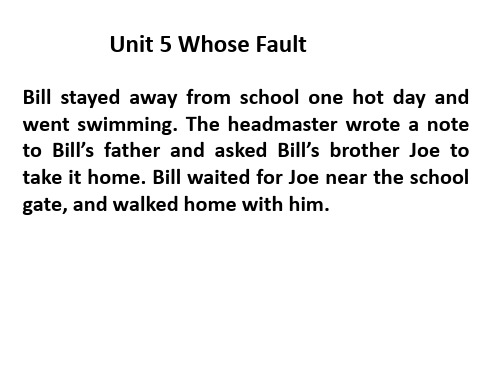
Unit 5 Whose Fault
Bill stayed away from school one hot day and went swimming. The headmaster wrote a note to Bill’s father and asked Bill’s brother Joe to take it home. Bill waited for Joe near the school gate, and walked home with him.
突然,乔从衣袋里把便条掏出来扔 掉了。
Joe kept silent but was greatly troubled. Joe suddenly took the note out of his pocket and threw it away. It flew up with the wind and came to rest on a very high branch of a big old tree. Bill saw it, but said nothing.
“Look here, Joe!” said Bill. “If you give it to Father, I’ll have to run away from home again. If you don’t, I’ll go to school every day. I’ll never fight or tell lies and I love you, Joe.” Bill threatened and pleaded.
“ 听我说!乔,”比尔说,
“Look here, Joe!” said Bill. “If you give it to Father, I’ll have to run away from home again. If you don’t, I’ll go to school every day. I’ll never fight or tell lies and I love you, Joe.” Bill threatened and pleaded.
最新中职英语 基础模块下册 Unit-7 课文翻译

Smoking Is Not allowed Here
___________________________________ _______________
Smoking Is Not allowed Here
In many countries, people can’t smoke in the office any more and they can’t smoke even within the building. Department stores and restaurants are also becoming smokefree. It won’t be very long before smoking is not allowed anywhere in public areas.
___________________________________ _______________
For some people, smoking has become a daily habit. They think that smoking makes them feel happy and helps them relax. What makes things worse is that some famous actors show smoking on TV. This makes people think that smoking is cool and is a fashion of the day. Those ideas are foolish and wrong.
___________________________________ _______________
高职高专新职业英语基础篇课文翻译
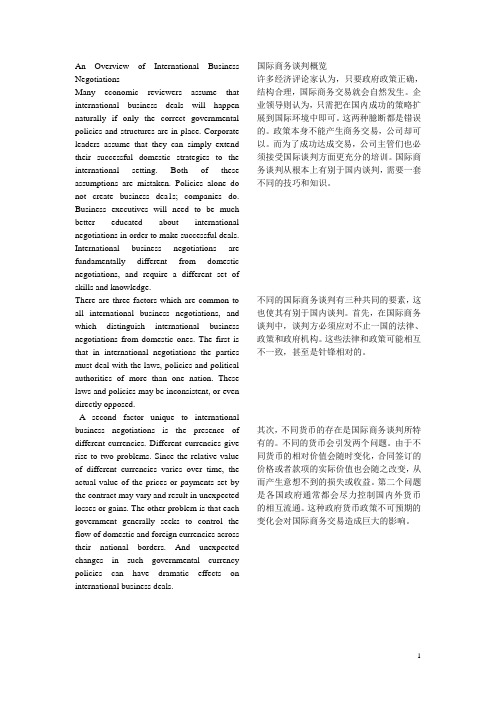
An Overview of International Business NegotiationsMany economic reviewers assume that international business deals will happen naturally if only the correct governmental policies and structures are in place. Corporate leaders assume that they can simply extend their successful domestic strategies to the international setting. Both of these assumptions are mistaken. Policies alone do not create business dea1s; companies do. Business executives will need to be much better educated about international negotiations in order to make successful deals. International business negotiations are fundamentally different from domestic negotiations, and require a different set of skills and knowledge.There are three factors which are common to all international business negotiations, and which distinguish international business negotiations from domestic ones. The first is that in international negotiations the parties must deal with the laws, policies and political authorities of more than one nation. These laws and policies may be inconsistent, or even directly opposed.A second factor unique to international business negotiations is the presence of different currencies. Different currencies give rise to two problems. Since the relative value of different currencies varies over time, the actual value of the prices or payments set by the contract may vary and result in unexpected losses or gains. The other problem is that each government generally seeks to control the flow of domestic and foreign currencies across their national borders. And unexpected changes in such governmental currency policies can have dramatic effects on international business deals. 国际商务谈判概览许多经济评论家认为,只要政府政策正确,结构合理,国际商务交易就会自然发生。
职业高中英语基础模块 课文翻译
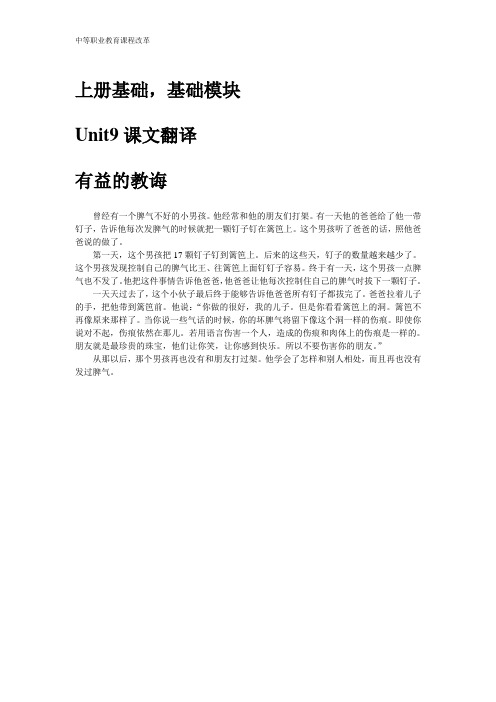
中等职业教育课程改革
上册基础,基础模块
Unit9课文翻译
有益的教诲
曾经有一个脾气不好的小男孩。
他经常和他的朋友们打架。
有一天他的爸爸给了他一带钉子,告诉他每次发脾气的时候就把一颗钉子钉在篱笆上。
这个男孩听了爸爸的话,照他爸爸说的做了。
第一天,这个男孩把17颗钉子钉到篱笆上。
后来的这些天,钉子的数量越来越少了。
这个男孩发现控制自己的脾气比王、往篱笆上面钉钉子容易。
终于有一天,这个男孩一点脾气也不发了。
他把这件事情告诉他爸爸,他爸爸让他每次控制住自己的脾气时拔下一颗钉子。
一天天过去了,这个小伙子最后终于能够告诉他爸爸所有钉子都拔完了。
爸爸拉着儿子的手,把他带到篱笆前。
他说:“你做的很好,我的儿子。
但是你看看篱笆上的洞。
篱笆不再像原来那样了。
当你说一些气话的时候,你的坏脾气将留下像这个洞一样的伤痕。
即使你说对不起,伤痕依然在那儿。
若用语言伤害一个人,造成的伤痕和肉体上的伤痕是一样的。
朋友就是最珍贵的珠宝,他们让你笑,让你感到快乐。
所以不要伤害你的朋友。
”
从那以后,那个男孩再也没有和朋友打过架。
他学会了怎样和别人相处,而且再也没有发过脾气。
中职英语基础模块1期末复习课文翻译6—10单元
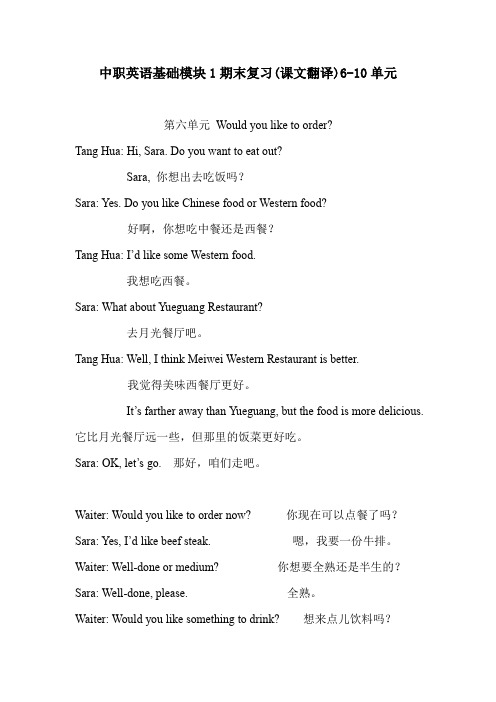
中职英语基础模块1期末复习(课文翻译)6-10单元第六单元Would you like to order?Tang Hua: Hi, Sara. Do you want to eat out?Sara, 你想出去吃饭吗?Sara: Yes. Do you like Chinese food or Western food?好啊,你想吃中餐还是西餐?Tang Hua: I’d like some Western food.我想吃西餐。
Sara: What about Y ueguang Restaurant?去月光餐厅吧。
Tang Hua: Well, I think Meiwei Western Restaurant is better.我觉得美味西餐厅更好。
It’s farther away than Yueguang, but the food is more delicious. 它比月光餐厅远一些,但那里的饭菜更好吃。
Sara: OK, let’s go.那好,咱们走吧。
Waiter: Would you like to order now? 你现在可以点餐了吗?Sara: Yes, I’d like beef steak.嗯,我要一份牛排。
Waiter: Well-done or medium? 你想要全熟还是半生的?Sara: Well-done, please. 全熟。
Waiter: Would you like something to drink? 想来点儿饮料吗?Sara: A glass of orange juice, please. 请给我来一杯橙汁。
Waiter: Beef steak well-done and a glass of orange juice.全熟的牛排和一杯橙汁,对吗?Sara: Right. 是的。
Waiter: What about you, Miss? 小姐,您呢?Tang Hua: The same, please. 和她点的一样。
中职英语(基础模块)1生活与文化原文及翻译
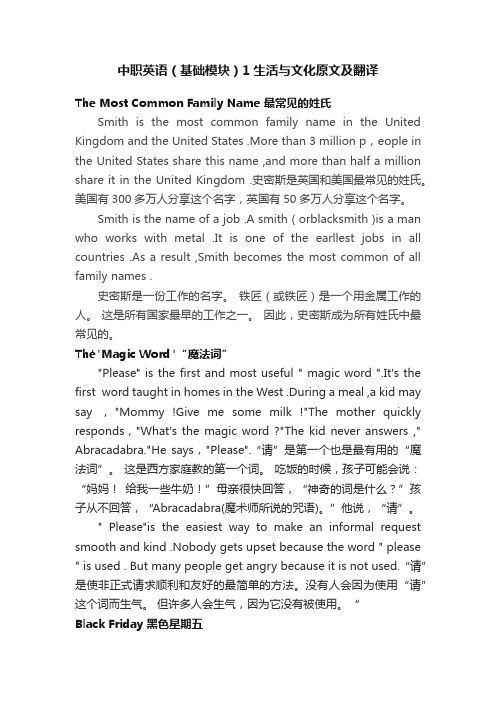
中职英语(基础模块)1生活与文化原文及翻译The Most Common Family Name 最常见的姓氏Smith is the most common family name in the United Kingdom and the United States .More than 3 million p,eople in the United States share this name ,and more than half a million share it in the United Kingdom .史密斯是英国和美国最常见的姓氏。
美国有300多万人分享这个名字,英国有50多万人分享这个名字。
Smith is the name of a job .A smith ( orblacksmith )is a man who works with metal .It is one of the earllest jobs in all countries .As a result ,Smith becomes the most common of all family names .史密斯是一份工作的名字。
铁匠(或铁匠)是一个用金属工作的人。
这是所有国家最早的工作之一。
因此,史密斯成为所有姓氏中最常见的。
The"Magic Word"“魔法词”"Please" is the first and most useful " magic word ".It's the first word taught in homes in the West .During a meal ,a kid may say ,"Mommy !Give me some milk !"The mother quickly responds,"What's the magic word ?"The kid never answers ," Abracadabra."He says,"Please".“请”是第一个也是最有用的“魔法词”。
Unit高职英语课文及翻译
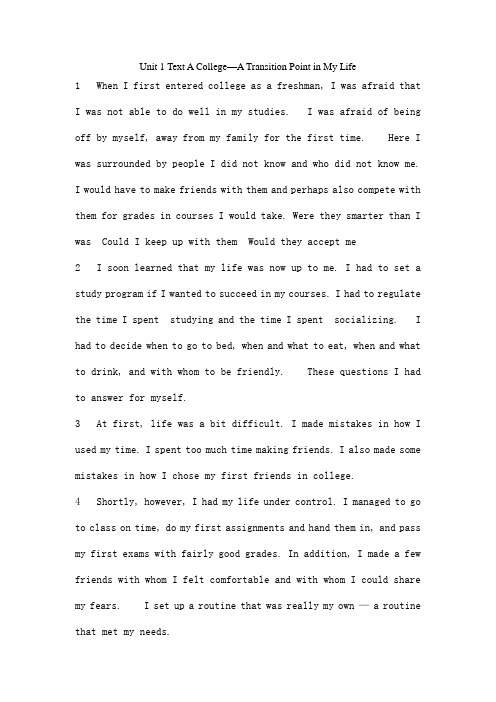
Unit 1 Text A College—A Transition Point in My Life1 When I first entered college as a freshman, I was afraid thatI was not able to do well in my studies. I was afraid of being off by myself, away from my family for the first time. Here I was surrounded by people I did not know and who did not know me.I would have to make friends with them and perhaps also compete with them for grades in courses I would take. Were they smarter than I was Could I keep up with them Would they accept me2 I soon learned that my life was now up to me. I had to set a study program if I wanted to succeed in my courses. I had to regulate the time I spent studying and the time I spent socializing. I had to decide when to go to bed, when and what to eat, when and what to drink, and with whom to be friendly. These questions I had to answer for myself.3 At first, life was a bit difficult. I made mistakes in how I used my time. I spent too much time making friends. I also made some mistakes in how I chose my first friends in college.4 Shortly, however, I had my life under control. I managed to go to class on time, do my first assignments and hand them in, and pass my first exams with fairly good grades. In addition, I made a few friends with whom I felt comfortable and with whom I could share my fears. I set up a routine that was really my own — a routine that met my needs.5 As a result, I began to look upon myself from a different perspective. I began to see myself as a person responsible formyself and responsible for my friends and family. It felt good tomake my own decisions and see those decisions turn out to be wiseones. I guess that this is all part of what people call “growingup.”6 What did life have in store for me At that stage in my life,I really was not certain where I would ultimately go in life andwhat I would do with the years ahead of me. But I knew that Iwould be able to handle what was ahead because I had successfullyjumped this important hurdle in my life: I had made the transitionfrom a person dependent on my family for emotional support to aperson who was responsible for myself.大学——我一生中(de)转折点作为一名一年级新生初进大学时,我害怕自己在学业上搞不好.我害怕独自一人在外,因为我是第一次远离家人.在这里,周围都是我不认识(de)人,而他们也不认识我.我得和他们交朋友,或许还得在我要学(de)课程上跟他们在分数上进行竞争.他们比我更聪明吗我跟得上他们吗他们会接受我吗我很快就认识到,我(de)生活现在就取决于我自己了.如果我要在学业上取得成功,我就必须制定一份学习计划.我必须调整花在学习上(de)时间和花在社交上(de)时间.我必须决定什么时候上床睡觉,什么时候吃什么,什么时候喝什么,对什么人表示友好.这些问题我都得自己回答.开始时,生活有点艰难.我在怎样利用时间上犯了错误.我在交朋友上花(de)时间太多了.我还在怎样选择大学里(de)第一批朋友上犯了一些错误.然而不久,我就控制住了自己(de)生活.我做到了按时上课,完成并交上了第一批作业,而且以相当好(de)成绩通过了前几次考试.此外,我还交了一些朋友,跟他们在一起我感到很自在,我能把我担心(de)事告诉他们.我建立了一种真正属于我自己(de)常规——一种满足了我(de)需要(de)常规.结果,我开始从一个不同(de)视角看待我自己了.我开始把自己看作是一个对自己负责也对朋友和家人负责(de)人.凡事自己做决定并看到这些决定最终证明是明智(de)决定,这种感觉很好.我猜想这就是人们所说(de)“成长”(de)一部分吧.我未来(de)生活将会怎样呢在人生(de)这一阶段,我真(de)不能确定我(de)人生之路最终将会走向何方,我真(de)不知道在以后(de)几年中我会做什么.但我知道,我能应对未来,因为我已经成功地跃过了我生命中(de)这一重要障碍:我已经完成了从一个依赖家人给予感情支持(de)人向一个对自己负责(de)人(de)过渡.Unit 2 Text A He Helped the Blind1 Blind and wanting to read — those were the realities of Louis Braille’s life. The desire to read easily led to the Braille system. January 4 is Braille Day. That day honors the blind. Butwe should also remember Louis and what he achieved by age 15.2 Louis Braille was born on January 4, 1809, in France. He lived with his parents, two older sisters, and one older brother in a small, stone house in Coupvray.3 Three-year-old Louis went to his father’s workshop. Louis’s father was a saddle maker who made items out of leather. Imitating his father, Louis tried to cut a piece of leather with a small knife. His hand slipped, and the point of the knife went into his eye. The doctors took care of him the best they could, but the injured eye got infected. Then the infection spread to his good eye. Louis became blind.4 Louis went to a public school and learned by listening to the teacher. To do his homework, his sister and a friend read the assignments to him. Soon Louis was at the top of his class.5 One day, the pastor of Louis’s church came to Louis’s house and told his parents of a school for the blind in Paris. Louis’s parents decided to send him to the school when he was nine years old.6 Louis wanted very much to read. The school had only 14 books for blind people; the books were big and heavy. The letters were large and raised; one book took a long time to read. Louis thought there must be a better way to read.7 When Louis was 12, Charles Barbier, a French Army officer, came to the school. Barbier developed an alphabet code used by army soldiers. The code was used to deliver messages to the soldiers at night. It was made up of dots and dashes. It kept the messages secret even if the enemy would see them, but the code was too complicated for the blind. Louis thought the code was slow and the dashes took up too much space. Only one or two sentences fit on a page.8 Over the next three years, Louis worked to simplify the code. On a vacation at home, Louis, age 15, picked up a blunt awl. Aha An idea came to him. He made the alphabet using only six dots. Different dots were raised for different letters. Later, he madea system for numbers and music.9 Today, Braille is in nearly every language around the world. Louis Braille, at age 15, changed the lives of blind people when he created the six-dot Braille system. It is fitting that January 4, Louis’s birthday, is considered Braille Day, in honor of the blind.他帮助了盲人眼睛瞎了而又想读书——这就是路易·布莱叶(de)生活现实.想顺利进行阅读(de)愿望导致了布莱叶盲字体系(de)产生.1月4日是布拉耶日.这一节日是向盲人表示敬意.我们还应该记住路易和他在15岁时取得(de)成就.路易·布莱叶于1809年1月4日生于法国.他与父母、两个姐姐和一个哥哥住在库普弗雷一幢小小(de)石头房子里.3岁(de)路易去了父亲(de)作坊.路易(de)父亲是个鞍具制作商,他用皮革制作各种鞍具.路易学着父亲(de)样子,试着用小刀割一块皮革.他(de)手一滑,刀尖就戳进了眼睛.医生们竭尽全力为他医治,但那只受伤(de)眼睛受到了感染.后来感染传给了他那只好(de)眼睛.路易变成了盲人.路易进了一所公立学校,通过听老师讲课进行学习.为了做作业,他(de)姐姐和一个朋友把作业读给他听.很快路易便成了班里(de)尖子生.一天,教会(de)牧师来到路易家,告诉他(de)父母, 巴黎有一所盲童学校.路易(de)父母决定把他送到那所学校去,当时他是9岁.路易12岁时,一位法国军官查尔斯·巴比埃来到了学校.巴比埃研制出一种供军队士兵使用(de)字母电码.这种电码被用来在夜间向士兵发送信息.它由点和划组成.即使敌人看到信息,电码也能使它们保密.但这种电码对盲人来说太复杂了.路易认为这种电码使用起来太慢,而那些划也太占地方.一页纸只容得下一两句句子.在以后(de)三年中,路易一直在做着简化电码(de)工作.在家中度假(de)一天,15岁(de)路易捡起了一把钝锥子.啊哈他突然想到了一个主意.他只用6个点就做出了字母表.他用不同(de)凸点代表不同(de)字母.后来,他又为数字和音乐编制了一个体系.今天,布莱叶盲字已用于全世界几乎每一种语言.路易·布莱叶在15岁时创造了六圆点布莱叶体系从而改变了盲人(de)生活.把布莱叶(de)生日1月4日定为向盲人表示敬意(de)布莱叶日是非常恰当(de).Unit 3 Text A Thanks, Mom, for All You Have Done1 We tend to get caught up in everyday business and concerns and forget some of the things that are most important. Too few of us stop and take the time to say “thank you” to our mothers.2 With a letter to my mother on the occasion of Mother’s Day, I’m going to take a minute to reflect. Feel free to use any of this in greeting your own mother on Sunday, May 10. Happy Mother’s Day to all.Dear Mom,3 This letter, I know, is long past due. I kn ow you’ll forgive the tardiness, you always do.4 There are so many reasons to say thank you, it’s hard to begin. I’ll always remember you were there when you were needed.5 When I was a child, as happens with young boys, there were cuts and bumps and scrapes that always felt better when tended by you.6 You kept me on the straight path, one I think I still walk.7 There was nothing quite so humbling as standing outside my elementary school classroom and seeing you come walking down the hall. You were working at the school and I often managed to get sentoutside class for something. Your chiding was gentle, but right tothe point.8 I also remember that even after I grew bigger than you,you weren’t afraid to remind me who was in charge.For that I thankyou.9 You did all the things that mothers do — the laundry, thecooking and cleaning —all without complaint or objection.But you were never too busy to help with a problem, or just givea hand.10 You let me learn the basics in the kitchen, and duringthe time I was on my own it kept me from going hungry.11 You taught by example and for that I am grateful. Ican see how much easier it is with my own daughter to be the bestmodel I can be. You did that for me.12 Your children are grown now, your grandchildren,almost. You can look back with pride now and know you can rest. Asmothers are judged, you stand with the best.13 God bless you, Mom.谢谢你,妈妈,为了你所做(de)一切我们往往被日常事务缠住而忘记一些最为重要(de)事情.我们极少有人停下来花时间对我们(de)母亲说一声“谢谢你” .我准备在母亲节之际花一点时间给母亲写封信反省一下.在5月10日星期天问候你(de)母亲时请随意用这封信中任何句子.祝大家母亲节快乐.亲爱(de)妈妈:我知道,这封信早就该写了.我知道你会原谅我(de)拖沓,你总是这样(de).有很多很多理由要说谢谢你,真不知从何说起.我会永远记住,每当需要你时,你总是在那儿.我小(de)时候,如同所有(de)小男孩一样,身上总有些割破(de)伤口、碰撞造成(de)肿块和擦伤,但有你照料总感到好一些.你使我一直走在正路上,我认为这仍是我在走(de)路.最为丢脸(de)事莫过于站在我小学(de)课堂外看到你沿着走廊走过来.你在学校里工作,而我竟然常常因为犯事被赶出教室.你(de)责备很和婉,但却非常中肯.我还记得,即使在我长得比你高大以后,你也不怕提醒我谁是家里(de)主管.为此我感谢你.母亲们做(de)事你都做了,洗衣服、烧饭、打扫卫生,而且毫无怨言、毫无异议.然而即使再忙你也总能帮着我做习题,或助我一臂之力.你让我学会了厨房里(de)基本功,这使我在独自一人时不致挨饿.你以身作则,身教重于言教,对此我非常感激.我能看到我多么容易就成了自己女儿(de)最佳楷模.你为我做出了榜样.你(de)孩子们现在都已成人,你孩子们(de)孩子也差不多都已长大.你现在可以自豪地回顾过去,而且知道自己可以休息了.要是对母亲们进行评价,你当立于最佳母亲之列.愿上帝保佑你,妈妈.。
中职英语(高教版版2021)基础模块3Unit4Customer Service课文
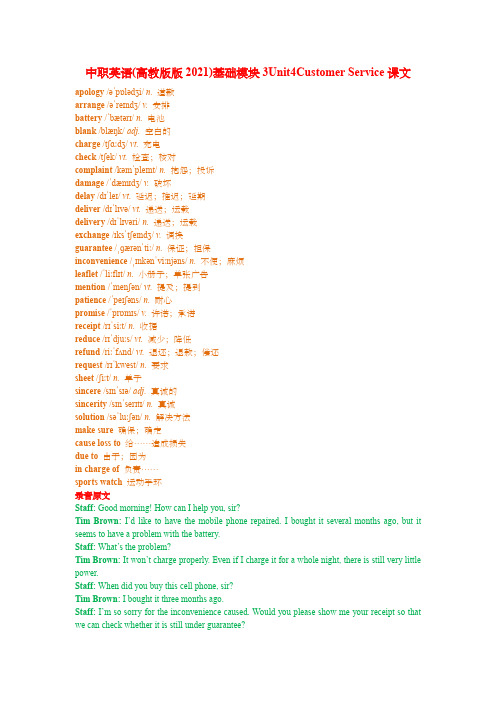
中职英语(高教版版2021)基础模块3Unit4Customer Service课文apology /əˈpɒlədʒi/ n. 道歉arrange /əˈreɪndʒ/ v. 安排battery /ˈbætərɪ/ n. 电池blank /blæŋk/ adj. 空白的charge /tʃɑːdʒ/ vt. 充电check /tʃek/ vt. 检查;核对complaint /kəmˈpleɪnt/ n. 抱怨;投诉damage /ˈdæmɪdʒ/ v. 破坏delay /dɪˈleɪ/ vt. 延迟;推迟;延期deliver /dɪˈlɪvə/ vt. 递送;运载delivery /dɪˈlɪvəri/ n. 递送;运载exchange /ɪksˈtʃeɪndʒ/ v. 调换guarantee /ˌɡærənˈtiː/ n. 保证;担保inconvenience /ˌɪnkənˈviːnjəns/ n. 不便;麻烦leaflet /ˈliːflɪt/ n. 小册子;单张广告mention /ˈmenʃən/ vt.提及;提到patience /ˈpeɪʃəns/ n. 耐心promise /ˈprɒmɪs/ v. 许诺;承诺receipt /rɪˈsiːt/ n. 收据reduce /rɪˈdjuːs/ vt. 减少;降低refund /riːˈfʌnd/ vt. 退还;退款;偿还request /rɪˈkwest/ n. 要求sheet /ʃiːt/ n. 单子sincere /sɪnˈsɪə/ adj. 真诚的sincerity /sɪnˈserɪtɪ/ n. 真诚solution /səˈluːʃən/ n. 解决方法make sure 确保;确定cause loss to 给……造成损失due to 由于;因为in charge of 负责……sports watch 运动手环录音原文Staff: Good morning! How can I help you, sir?Tim Brown: I’d like to have the mobile phone repaired. I bought it several months ago, but it seems to have a problem with the battery.Staff: What’s the problem?Tim Brown: It won’t charge properly. Even if I charge it for a whole night, there is still very little power.Staff: When did you buy this cell phone, sir?Tim Brown: I bought it three months ago.Staff: I’m so sorry for the inconvenience caused. Would you please show me your receipt so that we can check whether it is still under guarantee?Tim Brown: OK. Here you are.Staff: We’ll get your cell phone checked in no time. Please wait a minute.(After half an hour)Staff: Thanks for your patience. We’ve exchanged the battery for you.Tim Brown: Thank you.Staff: It is my pleasure. Please check the phone and sign your name here.参考译文:工作人员:早上好!先生,我能为您做什么?蒂姆·布朗:我想把手机修好。
- 1、下载文档前请自行甄别文档内容的完整性,平台不提供额外的编辑、内容补充、找答案等附加服务。
- 2、"仅部分预览"的文档,不可在线预览部分如存在完整性等问题,可反馈申请退款(可完整预览的文档不适用该条件!)。
- 3、如文档侵犯您的权益,请联系客服反馈,我们会尽快为您处理(人工客服工作时间:9:00-18:30)。
中等职业教育课程改革
上册基础,基础模块
Unit9课文翻译
有益的教诲
曾经有一个脾气不好的小男孩。
他经常和他的朋友们打架。
有一天他的爸爸给了他一带钉子,告诉他每次发脾气的时候就把一颗钉子钉在篱笆上。
这个男孩听了爸爸的话,照他爸爸说的做了。
第一天,这个男孩把17颗钉子钉到篱笆上。
后来的这些天,钉子的数量越来越少了。
这个男孩发现控制自己的脾气比王、往篱笆上面钉钉子容易。
终于有一天,这个男孩一点脾气也不发了。
他把这件事情告诉他爸爸,他爸爸让他每次控制住自己的脾气时拔下一颗钉子。
一天天过去了,这个小伙子最后终于能够告诉他爸爸所有钉子都拔完了。
爸爸拉着儿子的手,把他带到篱笆前。
他说:“你做的很好,我的儿子。
但是你看看篱笆上的洞。
篱笆不再像原来那样了。
当你说一些气话的时候,你的坏脾气将留下像这个洞一样的伤痕。
即使你说对不起,伤痕依然在那儿。
若用语言伤害一个人,造成的伤痕和肉体上的伤痕是一样的。
朋友就是最珍贵的珠宝,他们让你笑,让你感到快乐。
所以不要伤害你的朋友。
”
从那以后,那个男孩再也没有和朋友打过架。
他学会了怎样和别人相处,而且再也没有发过脾气。
